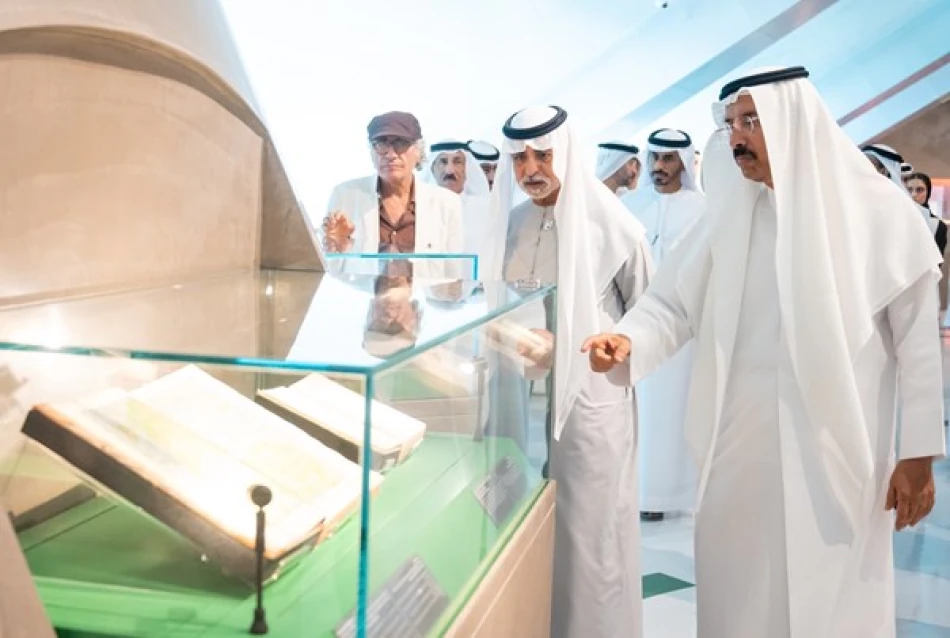
UAE's Cultural Leadership: Shaping a Global Beacon of Knowledge and Prosperity
UAE Positions Itself as Global Knowledge Hub Through Strategic Cultural Investment
The UAE's Minister of Tolerance and Coexistence has reinforced the nation's commitment to becoming a regional and global beacon of culture and knowledge, following a high-profile visit to Dubai's Mohammed bin Rashid Library. Sheikh Nahyan bin Mubarak Al Nahyan's remarks underscore the Emirates' strategic pivot toward knowledge-based economic development and soft power projection through cultural infrastructure.
Cultural Diplomacy as Economic Strategy
Sheikh Nahyan's visit to the Mohammed bin Rashid Library represents more than ceremonial engagement—it signals the UAE's systematic approach to leveraging cultural assets for long-term economic diversification. The minister emphasized that dialogue, comprehensive knowledge, and human interaction form the pathway to a world built on peaceful coexistence and mutual cooperation.
This approach mirrors successful models from Singapore and South Korea, where governments invested heavily in cultural and educational infrastructure as catalysts for economic transformation. The UAE appears to be following a similar playbook, positioning Dubai and the broader Emirates as intellectual crossroads between East and West.
Infrastructure Investment Meets Knowledge Economy Goals
World-Class Facilities Drive Innovation
The Mohammed bin Rashid Library showcases the UAE's commitment to creating knowledge infrastructure that rivals global standards. During his tour, Sheikh Nahyan examined the facility's nine specialized libraries, advanced restoration center, and digital transformation initiatives that blend cutting-edge technology with traditional scholarship.
The library's rare manuscript collection, spanning Arabic, Islamic, and international works in medicine, science, astronomy, and literature, positions Dubai as a serious player in academic research and cultural preservation. This investment strategy echoes Qatar's approach with its National Library and Saudi Arabia's NEOM project—Gulf states are competing to become regional knowledge capitals.
Digital Innovation Meets Cultural Heritage
The facility's smart digital transformation initiative reflects the UAE's broader strategy of positioning itself at the intersection of tradition and innovation. By digitizing rare manuscripts and implementing advanced preservation techniques using national expertise, the library creates both cultural value and potential intellectual property assets.
This dual approach—preserving historical knowledge while embracing digital accessibility—could attract international researchers, students, and cultural institutions seeking partnerships in the region.
Strategic Implications for Regional Competition
The UAE's cultural investment strategy serves multiple objectives beyond education and preservation. As regional competition intensifies between Gulf states, cultural soft power becomes increasingly valuable for attracting international talent, tourism, and investment.
Sheikh Nahyan's emphasis on the UAE as a "beacon of culture and knowledge" directly challenges Saudi Arabia's Vision 2030 cultural initiatives and Qatar's post-World Cup cultural positioning. The Emirates appears to be doubling down on its reputation as the region's most internationally accessible and culturally diverse hub.
Economic Diversification Through Knowledge Assets
The minister's focus on culture and knowledge as foundations for sustainable development aligns with the UAE's post-oil economic strategy. By creating world-class cultural institutions, the country builds the intellectual infrastructure necessary for a knowledge-based economy.
This approach has proven successful in other contexts—Ireland's transformation from agricultural economy to tech hub relied heavily on educational and cultural investments that attracted multinational corporations and skilled workers. The UAE appears to be applying similar principles, using cultural assets to support broader economic diversification goals.
The Mohammed bin Rashid Library visit represents more than cultural appreciation—it demonstrates the UAE's systematic approach to building soft power assets that support long-term economic competitiveness. As global economies increasingly value intellectual capital and cultural connectivity, the Emirates' investment in knowledge infrastructure positions it advantageously for future growth beyond traditional energy sectors.
Most Viewed News

 Layla Al Mansoori
Layla Al Mansoori






